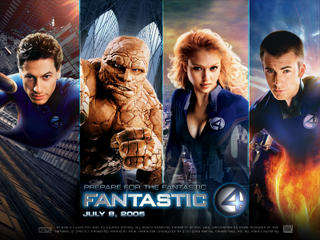 A look at the previous post list for The Magic Lantern Show reads more like an inventory list from a comic book shop than a blog about films: Fantastic Four, Batman, Sharkboy, Star Wars. Fanboys unite! Nevertheless, these films are the hits of the summer. Why the attraction to tales about super-heroes? Is it just an opportunity to impress the kids with "gee whiz" effects and ultra-cool CGI? Or is there something more ancient and primal in tales about heroic individuals with exceptional powers?
A look at the previous post list for The Magic Lantern Show reads more like an inventory list from a comic book shop than a blog about films: Fantastic Four, Batman, Sharkboy, Star Wars. Fanboys unite! Nevertheless, these films are the hits of the summer. Why the attraction to tales about super-heroes? Is it just an opportunity to impress the kids with "gee whiz" effects and ultra-cool CGI? Or is there something more ancient and primal in tales about heroic individuals with exceptional powers?One of the oldest stories known is the Epic of Gilgamesh. Nearly 5,000 years ago, Gilgamesh was the King of Uruk who was supposedly two-thirds divine and one-third human (did he have three parents?). His super-human adventures included a quest for immortality, fighting the Bull of Heaven, and encountering the lone survivor of the Great Flood. Gilgamesh is joined in his adventures by his comrade-in-arms Enkidu, the wild man of the forest and one of the few mortals who can hold his own in combat against the King of Uruk. Gilgamesh and Enkidu face off against the vain and capricious Sumerian gods who have little regard for humans and their cities. And now whenever the tree demon Humbaba or the sky-lord Anu and his wicked daughter Ishtar threaten the fair city of Uruk we need have no fear for Gilgamesh and Enkidu are here!
So you see that we have been telling stories like the Fantastic Four for nearly 5,000 years. Like the Epic of Gilgamesh the film asks us to consider what it means to be great and powerful. Pay attention to the conversations among the characters about power and prestige. Who has power? Is it the handsome and wealthy corporate czars like Victor Von Doom, or the fallible, flawed yet fantastic family of four who work together to champion good. This discussion of fate and using power for the greater good may be the film's most spiritual subtext.
Another light that shines in this film, albeit a bit dimly, is the virtue of family and friendship. Dr. Doom plays a satanic role in the story by using subterfuge to target the emotional character weaknesses of the four in order to turn them against each other. Ben Grimm's resentment and alienation is used to anger him against Reed Richards. Reed Richard's guilt and lack of confidence becomes his stumbling block. Johnny Storm is pulled away from the greater good by his greed, arrogance, and triviality. Susan Storm may be the team's only hope but she is frustrated for she is too often ignored as if she were invisible. To overcome their weaknesses, the Fantastic Four have to mature and learn to take responsibility for the awesome powers bestowed upon them by fate. Too bad Spider-Man wasn't around early on to give them some advice.
Don't expect the same depth and complexity available in this summer's other superhero film Batman Begins (see below). Fantastic Four is a more humorous and lighter-hearted story. Parents need to screen it for younger children. The film is marred by only a few unnecessary moments of cheap innuendo and a sampling of gory violence. Nonetheless, I hope the film does well and that a sequel is in the works. For whenever danger strikes I want to know that the Fantastic Four are ready to answer the call to action. Besides, Gilgamesh and Enkidu haven't been aswering their calls in quite a while.
No comments:
Post a Comment